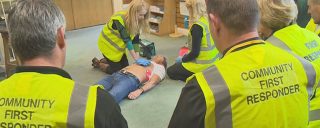CFR Ireland
Chain of Survival
CFR Ireland
Chain of Survival
The chain of survival refers to a series of actions that, when put into motion, reduce the mortality associated with cardiac arrest. Like any chain, the chain of survival is only as strong as its weakest link. The four interdependent links in the chain of survival are early access, early CPR, early defibrillation, and early advanced cardiac life support.
The chances of survival following a cardiac arrest are considerably improved if there is a rapid, coordinated response to the emergency. The National Ambulance Service supports the American Heart Association’s ‘Chain of Survival’ concept which is a process of four steps to be enacted to ensure an effective response to an acute Cardiac Emergency.
- Early access to Emergency Medical Services (EMS) This involves recognising that a person is in cardiac arrest and calling for help by phoning 112 (the single European emergency call number) or 999. There is considerable lack of awareness in the community as to the appropriate action to be taken in the event of a collapse. It is advisable to always contact the National Ambulance Service first before moving on to the next step so that professional help can be dispatched immediately. In addition, once connected to the emergency service, immediate assistance can be given by way of telephone advice to support you.
- Early Cardiopulmonary Resuscitation (CPR) This is a manual technique for attempting to revive collapsed individuals using rescue breathing and chest compressions. When someone has a Cardiac Arrest this procedure is undertaken in order to keep the person’s brain, heart and other vital organs supplied with blood and oxygen until medical help arrives. In order to be effective, training in the use of CPR is essential. From the moment of collapse to defibrillation the chance of survival decreases by 7 to10% per minute when CPR is not being performed.
- Early Defibrillation
Defibrillation is the delivery of an electric shock to a person’s chest to help restore the normal function of the heart. In order to be effective and safe, training in the use of a defibrillator is essential. - Early Advanced Cardiac Life Support (ACLS) Advanced medical care is usually given in a hospital setting, however ACLS can also be delivered in a pre-hospital or community setting by trained personnel. In the out of hospital setting in Ireland, this is most commonly delivered by General Practitioners, but increasingly by Advanced Paramedics. The Chain is only as strong as its weakest link and if any of the links are missing when someone suffers a sudden cardiac arrest, the chance of survival is limited.

Tips on:
Contact
CFR Ireland
ABOUT CFR
Founded
Number of Groups
Number of Volunteers
AED Registered
CFR Ireland
JOIN OUR NEWSLETTER
